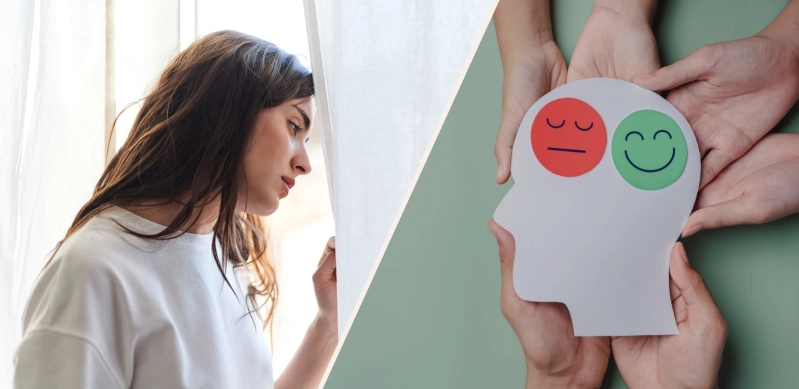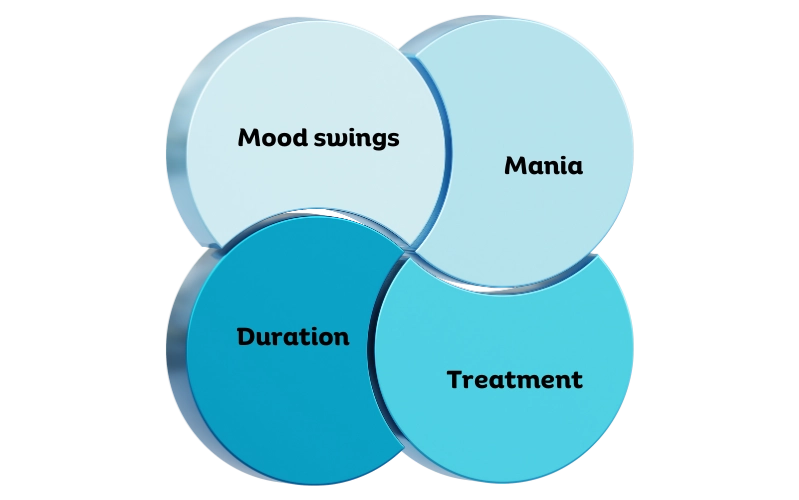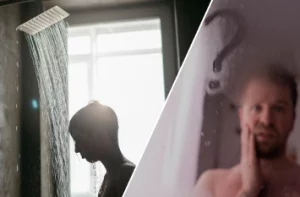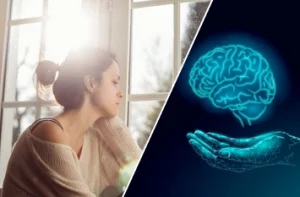Depression and bipolar disorder are two commonly misunderstood mental health conditions that have similar symptoms but require different treatment approaches. Both can significantly impact a person’s daily life, leading to difficulties in work, relationships, and overall well-being. According to the National Institute of Mental Health, approximately 17.3 million adults in the US have had at least one major depressive episode, while an estimated 4.4% of adults experience bipolar disorder at some point in their lives.
In this blog, we will explore the differences between depression and bipolar disorder to help you better understand these conditions.
Depression is a mood disorder characterized by persistent feelings of sadness, hopelessness, and loss of interest in activities that used to bring pleasure. It is more than just feeling down or having a bad day; it is a prolonged state of low mood that can interfere with daily functioning.
According to mental health experts, there are several types of depression, including major depressive disorder (MDD), persistent depressive disorder (PDD), and seasonal affective disorder (SAD). All the types are sometimes marked by intense feelings of sadness, irritability, and a loss of interest in previously enjoyable activities.
In females, hormonal changes during pregnancy and postpartum can lead to postpartum depression. In contrast, men may experience male depression characterized by anger, irritability, and aggression. The symptoms of depression usually last for weeks or months and can become chronic if left untreated.
Depression symptoms can vary from person to person, but the most common signs include:
It is essential to seek a professional diagnosis if you experience these symptoms for more than two weeks. A mental health expert can determine if you have depression and provide the appropriate treatment.
The good news is that depression is a highly treatable condition, and most people respond well to treatment. The primary treatment approach includes psychotherapy, medication, or a combination of both. During therapy sessions, a mental health professional will help you identify the root cause of your depression and develop coping strategies.
Antidepressant medications can also help balance brain chemicals responsible for regulating mood. However, they may come with side effects such as weight gain, nausea, or decreased sex drive.
Other lifestyle changes can also improve your symptoms of depression, including regular exercise, healthy eating habits, and getting enough sleep.
Bipolar disorder (formerly known as manic-depressive illness) is a mental health condition characterized by extreme shifts in mood, energy, and activity levels. People with bipolar disorder may experience periods of intense highs (mania) followed by lows (depression), or they may have a mix of both at the same time.
There are several types of bipolar disorder, including bipolar I, bipolar II, and cyclothymic disorder. Bipolar I is marked by episodes of mania and depression, while bipolar II involves periods of hypomania (less severe mania) and depression. Cyclothymic disorder is a milder form of bipolar disorder with less intense mood swings.
The symptoms of bipolar disorder can vary depending on the type and severity, but they generally include:
If left untreated, bipolar disorder can lead to severe consequences such as damaged relationships, substance abuse issues, or suicidal thoughts.
Bipolar disorder requires lifelong management, and the most effective treatment approach involves a combination of medication and therapy. Mood stabilizers, antipsychotics, and antidepressants are commonly prescribed to help stabilize mood and manage symptoms.
Therapy can also be beneficial in helping individuals with bipolar disorder understand their condition, develop coping strategies, and improve their overall quality of life.
Other lifestyle changes, such as avoiding drugs and alcohol, maintaining a consistent sleep schedule, and reducing stress, can also help manage bipolar symptoms.
While both depression and bipolar disorder involve changes in mood and can have overlapping symptoms, there are a few key differences that set them apart.
According to mental health experts, the difference between depression and bipolar depression is that people with bipolar disorder experience both mania and depression, while those with depression only experience the latter.
Major depressive disorder (MDD) is a subtype of depression, and it is not the same as bipolar depression. MDD involves prolonged periods of low mood without any episodes of mania or hypomania.
However, some people with bipolar disorder may also experience episodes of MDD during their depressive phase. This is known as “bipolar depression” and requires a different treatment approach than MDD.
Furthermore, bipolar disorder is a lifelong condition, while MDD can be treated and resolved in some cases.
Depression and bipolar disorder are two distinct mental health conditions that require proper treatment and management. While they may share some similarities, such as changes in mood, their key differences lie in the duration, severity, and treatment approach. It is crucial to seek help if you experience any symptoms of either condition, as early intervention can greatly improve your quality of life. Remember that seeking help is a sign of strength, and it is essential to prioritize your mental health.
For more information and guidance related to Mental and Behavioral Health, get in touch with our specialized Adult Mental Health Expert!






